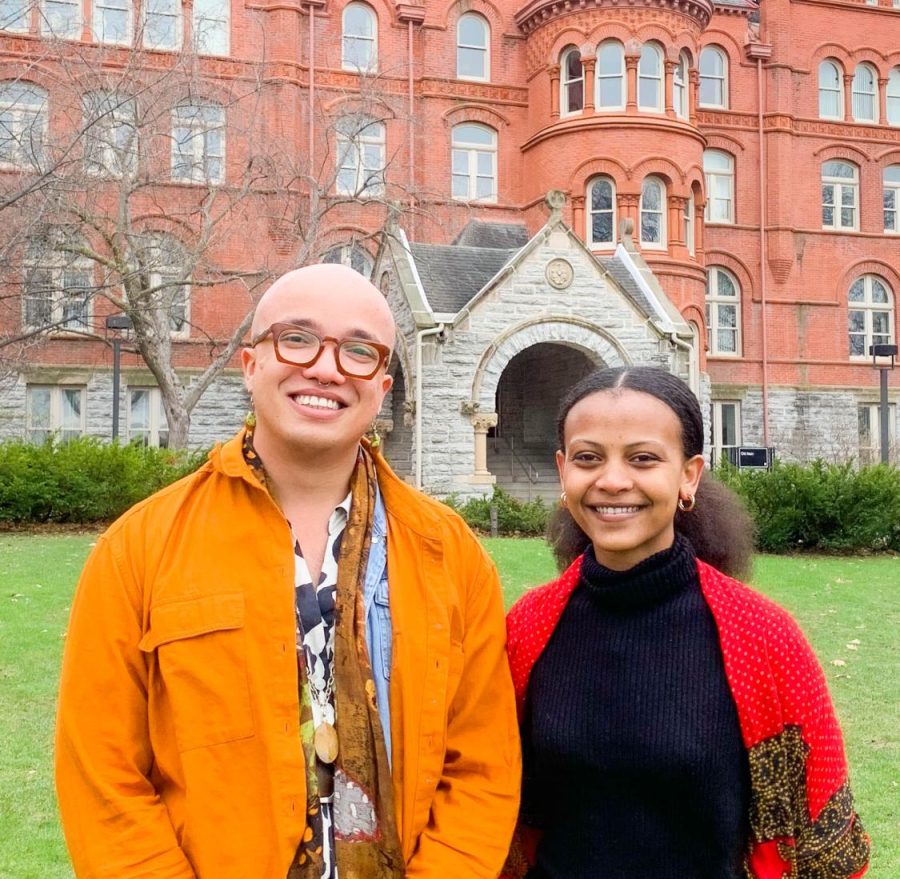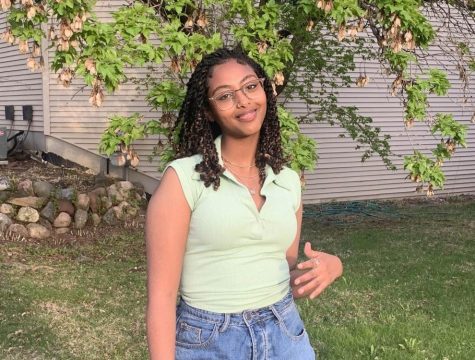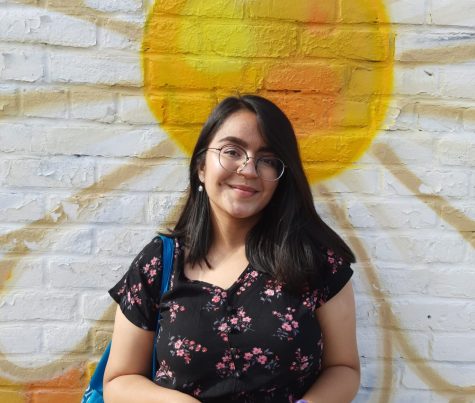Blackness Uncensored: building Black spaces
April 20, 2023
Blackness is fluid; it meanders throughout this campus multifaceted in its appearance. Tackling what uncensored Blackness looks like at Macalester, Milkee Bekele ’24 and Dipakshi Sarma ’24 continue to delve deeper into the beating heart of Black studenthood with the second edition of the ‘Blackness Uncensored’ series: ‘building Black spaces.’ This edition looks to showcase the beauties of Blackness within the many corners of this campus, featuring Ben Levy ’23 and Feven Gebresilassie ’23.
Throughout their time at Macalester, Levy and Gebresilassie have made an astonishing impact on the networks of community they have cultivated for Black students. Within their respective fields, they have blended their passion for education and knowledge-building with mechanisms to uplift those around them.
Levy serves as the senior advisor for the Black Liberation Affairs Committee (B.L.A.C.), where they have also done work within communications and as a campus engagement chair. They are currently a Program Assistant for the Lealtad-Suzuki Center (LSC) for Social Justice, and one of the student leaders at Macalester Jewish Organization (MJO). Levy has utilized their position within these spaces to open up avenues through which students can sustain knowledge and education outside the confines of institutional schooling.
“Schooling is a tool to reproduce conformity to an effect, let the status quo continue to be,” Levy said. “Education is a process of reconnection to our own histories and contexts.”
“Both of those halves I would say are absolutely essential,” they continued.“The doing, and the learning. Education and living justify being in community in relation to others. They’re not separate. They both come together.”
Gebresilassie has worked at Afrika!, serving on the board as an event coordinator. Additionally, as an international African student and a chemistry major, Gebresilassie continues to bridge the gap between Black representation within chemistry and other STEM fields. Gebresilassie underscores the realities of what it means to be a Black woman in chemistry, emphasizing the importance of carving out Black studenthood for herself to pave the way for other Black students and chemists.
“Seeing people like you, people of color, Black students, especially international African students, it’s comforting, and also reassuring that this is what you’re meant to do, someone else has done it already,” Gebresilassie said. “And you’re not different; Black studenthood for me is seeing yourself in other students.”
Gebresilassie also points to the additional burden of internally creating a feeling of belonging that is put onto Black students within underrepresented fields like chemistry.
“I feel like I don’t belong,” Gebresilassie said. “Whenever I can, whatever I’m going to do, I’m going to do above and beyond to feel like I am part of this.”
The foundations that sustain higher educational institutions like Macalester rely on the exclusion of Blackness to do so. However, Black students have continued to pursue their passions and the quest for knowledge and education within their own sustained communities that exist beyond the scope of what such institutions can comprehend and try to contain.
Levy and Gebresilassie have been at the heart of Black community-building spaces in varying capacities, but continue to use these spaces as a mechanism to grant themselves and other Black students the opportunity to exist in their Blackness.
Levy points to uncensored Black spaces like the bi-weekly B.L.A.C. brunch.
“I’ve really enjoyed the brunches that B.L.A.C. has been doing,” Levy said. “Thanks to the work that Menal [Abdella ’23] put in and getting those started. They have been a wonderful place to just relax, to not think about any of this work that’s going on. Listen to music, meet people, get good food and relax, because that’s what it’s all about, right?”
While looking back at her time at Afrika! Gebresilassie highlights the driving force of this edition: the importance of building Black spaces, and doing so as a way to work alongside other Black African students.
“With Afrika!, it was rewarding, in essence, because at the time it felt like if [the Afrika! board] didn’t do it, no one else was going to,” Gebresilassie said. “To set up events where African students can come join in, is where I was really involved in making and building spaces [for African students].”
When creating avenues by which Black and BIPOC communities can enter into conversations with each other, Levy points to the creation of the BIPOC coalition as one step in that direction.
“Under the advising of Hana [Dinku], and in collaboration with Andrew Lee ’23, [the BIPOC coalition] was created with the intention of building solidarity amongst all of the cultural orgs on campus and creating a space in which we can plan, learn how to run or do things amongst ourselves,” Levy said. “Community building that’s being done from a position of people working within their communities and coming together in conversation with one another.”
Gebresilassie added more about her time working at the Center for Religious and Spiritual Life (CRSL), and the opportunity she had to witness other networks of BIPOC community-building spaces.
“I really like working at the CRSL, I really like learning about everybody else’s tradition,” She said.“Preparing the food, setting up the table, and just watching everyone come in, especially if it’s like a holiday, all dressed up, is one of the most rewarding things I’ve ever done at Macalester.”
The genesis of ‘Blackness Uncensored’ came when Bekele and Sarma began questioning the presence that “representation” has in shaping the ways Blackness and the identities of students of color is predetermined by institutions of higher education. “Representation,” oftentimes misunderstood by the white majority, is fueled by a Blackness that is imposed and untrue.
Tackling the multifacetedness of Blackness, Levy draws attention to what they call the “plurality of Black voices”.
“There’s not one Blackness that exists on campus,” Levy said. “What is Blackness? A political identity. These conversations demand the unknowing of oneself in relation to others. These educational spaces that allow for conversations that connect oneself to themselves and their communities, that are parts of the conversations that BLAC organizes as well as dialogue spaces that the LSC has put together.”
“The challenge that comes from that [representation], is, whose work and voice are being prioritized?” they continued. “I want to acknowledge too, that the plurality of Black voices that exists within them need to not be centralized, but acknowledged along with another. I’ve never been a fan of just sort of like singling out. Not singling out but uplifting.”
Levy continues to address the impositional power of “representation” in shaping the way Blackness is recognized at Macalester and higher education as a whole.
“The idea of forced visibility: visibility that isn’t done on our own terms, is or can be deceptive. It is visibility that is imposed without choice,” Levy said. “Bodies being promoted, within the context of racialized capitalism. That representation has been defined for us.”
Continuing on the avenue of chosen representation, Gebresilassie highlights the gravity of absent Blackness as an international African student navigating literal and metaphorical foreign spaces.
“The thief of joy has always been a nagging noise in your head of not fitting in or belonging and spaces that are new,” Gebresilassie said. “I guess Macalester is not an inherent home to anyone, it’s a new place for everybody else. But I think there’s different layers of newness, especially when you are coming from outside. I’m still a non-resident alien to this. It’s not enough to protect you.”
Existing in an institution that doesn’t grant for the existence and recognition of Blackness in all its forms, international and domestic. Seeing Blackness in different avenues, pushing and also strengthening boundaries, preserves and strengthens its multiplicity for the encouragement of others within the community.
“I like having role models, I look like you, and you have gone through similar processes as me. It’s a calming experience that very few can relate to, especially on campus,” Gebresilassie said. “It’s very nice to see people who came from the same route as you and are doing amazing things. Representation for me would be fighting impostor syndrome. Wherever, whichever space you are in, whatever classroom, feel like you’re supposed to be there, and take the space and feel worthy of it.”
Radical joy is a theme that ‘Blackness Uncensored’ hopes to continue uncovering. The beating heart of Blackness is radical joy; it is ongoing because Blackness and Black community is the embodiment of radical joy.
“Thinking about bell hooks’ ‘the love ethic’, and the establishment of communities based on their commitment to one another, based on creating responsibilities, mutual responsibilities, and just more broadly to have reciprocal relationship building through that,” Levy said. “The purpose feels like Black political education fields; it feels like liberatory work. Having these spaces for critical conversation and dialogue. Having spaces for just relaxing. All of that together. That’s sort of the driving force.”
“Radical joy would just be getting rid of that need to always find places to belong or fit in, rather than, instead, just see things like you,” Gebresilassie said. “Lack of guidance was such a thief of joy for me before I found my mentors, bridging that process between the second year and finding a professor that can help you. So, cultivating joy for me is addressing these thieves of joy. There are other people who are thinking of the same career paths and questions, so I would like to support them.”
Building Black spaces, by Black students for Black students, tethers institutionally fragmented Blackness to sustain Black community-building efforts beyond this institution. Blackness is not a monolith, and cannot be encapsulated because of the never-ending web of experiences and identities that make Blackness at Macalester.















